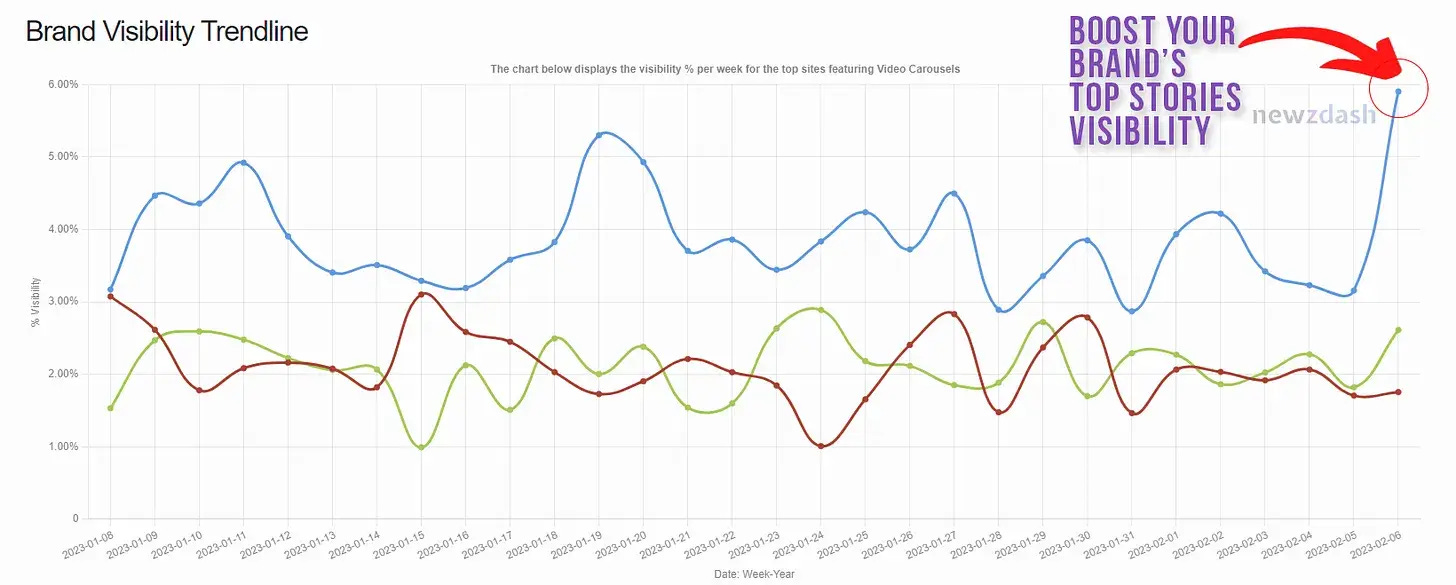Ask a News SEO: Gwen Milder
Gwen Milder, Senior SEO Editor for The Washington Post, joins us for a new Ask a News SEO interview, discussing relationship building and evergreen content
#SPONSORED
NewzDash: Best Real-Time News SEO Tool & Dashboard
Traditional tools don't work for News SEO; they check rankings once every 3-5 days, don’t track trends, and don't track Top Stories. NewzDash was developed to fit News SEO needs. Find your true search visibility, uncover important stories and get instant recommendations. Sign up for a demo today.
Hello, and welcome back. Jessie and Shelby here, back from a WTF is SEO? cottage retreat we can expense! Vegan fajitas were consumed, strategy was discussed and many snacks were purchased (were all of them eaten? We’ll let you answer that.).
This week: We are so excited to have Gwen Milder, Senior SEO Editor for The Washington Post, join us for a Ask a News SEO interview! We discuss the difference between true evergreen and durable content, Gwen’s thoughts on Google’s recent algorithm update and the importance of relationship building in the newsroom.
ALSO! Only 10 days until our internal linking masterclass with Barry Adams! Join us on March 28 at 11 a.m. ET/4 p.m. GMT for a one-hour live call. Your ticket also gets you access to a private event Slack channel, a one-page linking checklist and more. Tickets are limited! Secure your spot now. (Also available: Totes!)
ASK A NEWS SEO
WTF is SEO?: Given your background, what makes evergreen work well, specifically in the context of news? How do you make use of that content during breaking or tentpole events?
Gwen Milder: I have this metaphor that I use where evergreen is like the evergreen tree. And durable news is like a gallon of milk. It has a shelf life and then it goes bad. So when we're thinking about how you could use that piece of journalism, it helps determine whether something is worth updating. The audience isn't going to be there forever. The story will run its course.
But with evergreen, there's always going to be interest around it or there's always gonna be search volume around it. But you can also recycle, reuse and repurpose a lot of stuff that is news durables.
I’ve been trying to help editors understand that it is two different strategies when we're thinking about it. We're thinking about creating truly evergreen content. News durable probably isn't going to turn into an evergreen story — you can't say never because there's always exceptions (like COVID). But the metaphor of the gallon of milk really hammers home that this explainer may not last past the news cycle or once this story is out of the news.
Sometimes it’s taking content that we already had in a news story and giving background or context, and other times it’s determining whether we launch a new file or update another story. In that sense, we try to reuse, but then we need to look at the search landscape and our competitors and what developments are in the story. Then, a post can take a few different forms. We’ll usually work with editors and get the original reporter to update the story. But other times, we're lucky in having the general assignment desk and some news hubs around the world that can pick up stuff for us. The example today that comes to mind is where the international hub wrote a short FAQ on ByteDance, the Chinese company that owns TikTok. That is a totally different search intent than “what is in the TikTok bill?”
Depending on the desk and depending on the story, some editors are really attached to their work. So splicing can be tricky. We’ll try to find a happy medium where it’s looking at the different intent and answering the main questions first. And if we’re seeing more interest, we’ll try to add more. It’s really about hammering home and emphasizing who these people are that are looking for this and why they care about this journalism.
WTF is SEO?: Having worked at Motley Fool before, what’s the biggest difference in the strategies (particularly evergreen) between a niche publication and a national news organization?
Gwen Milder: At The Washington Post, the breadth of what we cover makes it really interesting, but also really challenging because the target audience is so different for each section, story and storyline.
There’s also a misconception that search audiences are anyone who searches for something. We know that that's not the case. We can make inferences or pretty good educated guesses on the types of people that would be searching for certain things, based on your knowledge level, your experience with that subject, and that makes you more of an appropriate audience for some of these pieces.
If you take it a step further, which of that audience is more likely or would be more likely to want to subscribe to us? This is how we connect it to the audience funnel. When I was working at the Motley Fool, which is a niche publication on investing and finance, a lot of that is already built into the content that they're creating, including who they are targeting.
We already know people that are searching for this stuff are interested in investing. They want to know about this and are invested and are the most ready to subscribe to us or buy a product. It’s a clearer line than with a news organization, where the journalists are not the same people thinking about the funnel. We (audience editors) have to act like the bridge.
For example, with the TikTok ban, someone Googling, “what is in this ban? Is TikTok going to be banned in the U.S.?” is going to be a very different audience than someone who wants to understand, “what does ByteDance own, and where are they based? Why is this a national security threat?” These are totally different stories and totally different people searching for this, and you can say that about almost any subject.
WTF is SEO?: How do you prioritize explainers on different angles on the same subject?
Gwen Milder: I'm always thinking of the people who are new audiences and non-subscribers. The subscribers we have are very loyal and we love them. But with search being such the top-of-the-funnel play and such a large new audience opportunity — and a lot of times, that might skew younger — we’re thinking, okay, what is more relatable?
A lot of the time, journalists are so in the weeds because they do know everything and they are experts on what they cover. Sometimes, it's harder for them to take a step back and say, “Okay, how can we keep this simple? How do we narrow this down to something really specific?”
And yes, we're going to have that great in-depth analysis piece, too, but then for news stories or for evergreen content, what's the barrier to entry here for people? When we think about what they're searching for, are they going to come to us?
WTF is SEO?: What are your thoughts on Google’s most recent algorithm update targeting some of these spammy tactics? How do you see this affecting the news landscape?
Gwen Milder: I’m not as pessimistic as some other people in our industry about Google and its algorithm. Google’s mission, at the end of the day, is still to connect folks to the best content.
Whether they want people to click through to those websites is a whole other discussion, but Google still wants to be serving the most appropriate content based on the searcher’s intent or what they think the intent is. Even with rolling AI into searches, I'm a little bit more open than some.
I think it's good for news organizations and news consumers, because inherently, news orgs strive to be unbiased. They're well-sourced and the reporters are on beats for a while, so the authority is there, too. But there are strategies and tactics we need to use in order to make it clear to Google and the algorithm. There's always been spammy tactics and every time the algorithm changes, it attacks it. It's an industry. Folks are going to figure out how to make their money. It’s Google's responsibility to continue to react to that and continue to evolve so that you get less of those spammy websites.
I am not somebody who thinks that search is getting worse. I think there's challenges. I don't think it's perfect. But when it comes to those spammy tactics in particular, I'm hopeful that the algorithm change will help.
WTF is SEO?: What is something that you wish you knew earlier in your SEO career?
Gwen Milder: The importance of relationship building and how challenging that might be for some depending on who you're talking to. Everyone searches differently, everyone thinks differently and everyone has a different opinion. There are still some misconceptions with folks who'd never had or worked with an SEO team, that we’re just trying to game the system. Or that it isn’t capital-J journalism. I wish I knew that going in. On the other hand, getting buy-in and then seeing it pay off, and being able to see people learn in real-time has been rewarding. Showing writers who wrote a story three months ago that it’s still getting hundreds of page views every day. At the end of the day, that’s what journalists want — to see their work get viewership. That makes it more rewarding.
#SPONSORED - The Classifieds
Positional: Cut through the noise with in-depth UX page scoring, enabling your team to rework problematic paragraphs & surgically place CTAs. Try Positional today!
Get your company in front of more than 10,600 writers, editors and digital marketers working in news and publishing. Sponsor the WTF is SEO? newsletter!
THE JOBS LIST
Audience or SEO jobs in journalism. Want to include a position for promotion? Email us.
The New York Times is hiring a Senior Search Editor (New York, NY).
FairPlay Sports Media is hiring a Sports SEO Manager (remote).
RECOMMENDED READING
🤖 Google news and updates
🤖 Google Search Central: INP (interaction to next paint) officially replaces FID in Core Web Vitals.
🤖 Google Search Central: Search Off the record podcast discussing crawling.
🤖 Barry Schwartz: Google’s March 2024 core update continues to roll out and will take up to a month to complete.
🤖 Google SearchLiaison: “Let the update complete before deciding if there are any fundamental changes you might want to make” to content on your site.
🤖 Barry Schwartz: “Google seems to be testing a thumbs-up button on image search results."
Google reportedly expected to replace perspectives filter with forums filter.
🤖 Barry Schwartz: Google updated its page experience docs to clarify ranking signals — guess where CWV falls?
🤖 Matt Southern: Google confirms they crawl high-quality content more often, and that user-centric content is the key to increasing crawl demand.
Even more recommended reading
🤔 Lily Ray: The Helpful Content Update – Reflecting on what happened
🤝🏻 Glenn Gabe: “LinkedIn's collaborative articles tanked with the Sep HCU and are surging with the March 2024 core update.”
🌐 MJ Cachón: Interesting SEO migrations to learn something from (thread).
👩🏫 Julia-Carolin Zeng for Moz: How the SERPs Guide Content — Whiteboard Friday.
🍔 Level343: E-E-A-T: Mastering Google’s Evolved Quality Standards.
😷 Emojis: Not news SEO, but friend of the newsletter (and logo designer!) Ming Wong wrote and designed this great emojis essay: Know what I mean?
What did you think of this week's newsletter?
(Click to leave feedback.)
Catch up: Last week’s newsletter
Have something you’d like us to discuss? Send us a note on Twitter (Jessie or Shelby) or to our email: seoforjournalism@gmail.com.
Written by Jessie Willms and Shelby Blackley .










